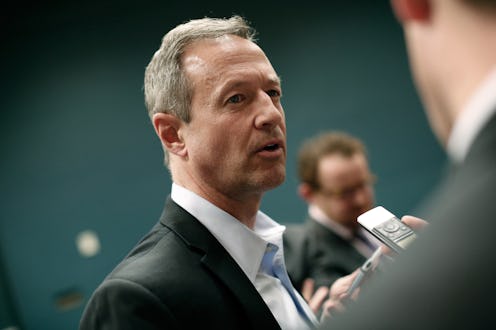News
Martin O'Malley's Marijuana Stance Has Evolved
In a move that only goes a tiny way towards balancing out the Hillary Clinton-dominated Democratic field with the outlandishly crowded Republican race, Martin O’Malley launched his presidential campaign Saturday. O’Malley, the former two term governor of Maryland, is billing himself as a younger, more progressive option than his Democratic rivals. “This is not the American dream,” he said, as he announced his candidacy in Baltimore Saturday. “It does not have to be this way. This generation of Americans still has time to become great. We must save our country now. And we will do that by rebuilding the dream.” But where does O'Malley stand on marijuana legalization?
O’Malley is pushing his progressive credentials by citing stances such as his support for same sex marriage, his opposition to the Iraq war, and his sustained interest in the plight of immigrants. He’s been vocal on the profound transformations wrought by global warming, and in his role as governor of Maryland, he ushered in a system making restricted drivers’ licenses available to undocumented immigrants. Like fellow Democratic contender and self-described socialist Bernie Sanders, O’Malley leans to the left of Clinton when it comes to economic issues. But unlike his older rivals, O’Malley, at 52, could capitalize on his relatively young age to appeal to a youthful voter-base.
One way to do that might be through a progressive stance on weed legalization. So where exactly does O’Malley stand on the issue?
It should be noted that O’Malley’s stint as mayor of Baltimore earned him a reputation as tough on drugs and crime. In attempting to clean up a city struggling with poverty and violence, O’Malley increased spending on drug treatment and also shut down many of Baltimore’s open-air drug markets. His innovations have received mixed reviews, especially in the light of Baltimore’s recent protests against police violence. “On one hand, more people got arrest records; on the other hand, murders went down,” Robert C. Embry, president of Baltimore poverty-fighting organization the Abell Foundation, told The Washington Post.
O’Malley’s legacy as Baltimore’s mayor suggests he closely ties drug use to the prevalence of crime, and comments he has made in the past bear this out. At the start of 2014, O’Malley — as governor of Maryland — opposed a move to make marijuana legal in the state for recreational use. “I’m not much in favor of it,” he told a local radio show (on WEAA 88.9 FM). “I’ve seen what drug addiction has done to the people of our state and the people of our city.” He made clear that he felt marijuana could act as “a gateway to even more harmful behavior.”
But his history on the issue evidences flexibility, nuance, and an increasingly liberal stance. O’Malley oversaw an initiative making medical marijuana available to a defined group of patients in 2013 (his stance on this issue had evolved since 2012, when he said he would veto such a plan).
Then, in April 2014, he announced his intention to sign into law a bill that would decriminalize the possession of small quantities of marijuana. The legislation amended Maryland’s procedure to ensure that civil fines (rather than criminal sanctions) would be imposed on those in possession of less than 10 grams of weed. “As a young prosecutor, I once thought that decriminalizing the possession of marijuana might undermine the public will necessary to combat drug violence and improve public safety,” O’Malley said in a statement as he signed the bill. “I now think that [it] is an acknowledgment of the low priority that our courts, our prosecutors, our police and the vast majority of citizens already attach to this transgression of public order and public health."
Ultimately, O’Malley has so far evinced a measured stance on marijuana — promoting proportionality in marijuana arrests, but not outright legalization for recreational use. But further evolution on issue, on which currently O’Malley perhaps fall short of the young progressive ideal, could be extremely politically valuable for the young candidate.
Vox points out that young Americans and Democrats particularly favor a liberal stance on marijuana — with around 51 percent of the voting public supporting legalization in 2014. Clinton’s approach to the matter has so far been cautious, and her ultimate pronouncement on the issue will rest on careful political calculus. But if O’Malley were to come out swinging early on, his stance could set him apart from his competition and boost his chances among the young demographic he seems eager to woo.
Images: Getty Images (3)
